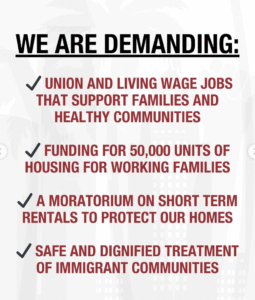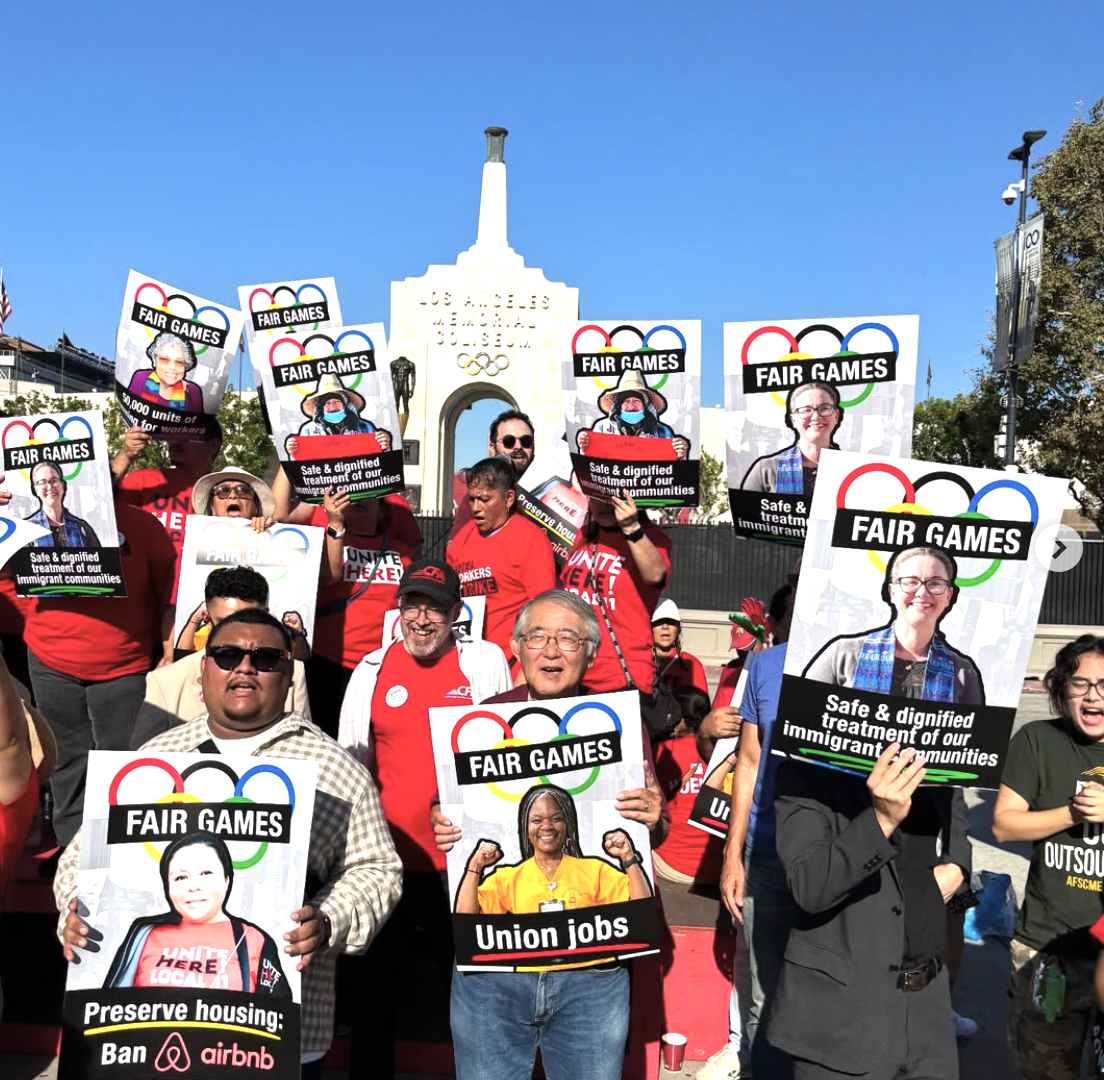Los Angeles is set to become the global stage for megaevents over the next three years. In 2026 the city will host the FIFA World Cup, in 2027 the Super Bowl, and in 2028 the Olympic and Paralympic Games. This unprecedented string of spectacles will make Los Angeles the first city ever to stage these events back to back, a transformation that boosters have marketed as proof of the city’s rise as the capital of megaevents. For elected officials and corporate sponsors, the Games promise profits and global attention. For many residents, however, these events bring the threat of displacement, surveillance, and financial strain at a time when public resources are already stretched thin.

On August 21, in front of the historic LA Memorial Coliseum, a broad coalition of workers, tenants, immigrants, and faith leaders gathered to launch the Fair Games campaign and its New Deal for Our Future platform. The coalition represents more than 60 organizations across Los Angeles and is calling on city leaders and Olympic organizers to ensure that LA28 leaves behind something more than debt and militarized policing. Their platform includes four core demands: the construction of 50,000 units of affordable housing for working families, union jobs that pay living wages, a moratorium on short-term rentals that are eroding neighborhoods and driving up rents, and protections for immigrant communities who already face criminalization and harassment.
Speaking after the press conference, Pastor Bridie Roberts emphasized the moral and spiritual dimensions of the campaign. She described the gathering of over 200 people at the Coliseum as a clear sign of the unity forming across labor, housing, immigrant rights, and faith communities. “We are sending a message to LA28, to the International Olympic Committee, and to the global forces coming into our region,” she said. “If the Games are going to leave a legacy in Los Angeles, it must be one that improves the lives of working people.” Roberts stressed that the jobs created by the Games must be permanent and sustainable, not temporary positions or unpaid volunteer labor. She also called for an end to the persecution of immigrant workers, noting that for the Games to be safe, ICE must leave Los Angeles.
Roberts also highlighted the need for transparency and community oversight. Angelenos, she argued, deserve a direct role in the decisions shaping the Olympics, rather than being sidelined while global institutions and corporate executives dictate the terms. “We must come together, we must pray together, march together, chant together, and stand in solidarity,” Roberts said. “That is the only way to ensure the Olympics leave behind a legacy that truly benefits our city.”
While grassroots leaders are demanding a people-centered Olympics, city officials have moved in the opposite direction. In January 2024, Mayor Karen Bass asked the Department of Homeland Security to classify LA28 as a National Special Security Event, four years earlier than any previous Olympics. That designation means local police will now coordinate closely with ICE, CBP, the FBI, the Secret Service, and the military. Past NSSE events have led to harassment of immigrants, racial profiling, militarized perimeters around venues that cut off access to homes and businesses, and the introduction of surveillance technologies that remain in cities long after the Games end. NOlympics LA, a grassroots coalition opposing the Olympics, warns that the early NSSE designation effectively hands ICE a green light to target immigrant communities and undermines the city’s claims of being a sanctuary.
NOlympics LA has also documented that public support for the Games is eroding as the harms become clearer. The group’s independent survey of 300 Los Angeles residents earlier this year revealed that 54 percent of respondents believed wildfire recovery should take priority over Olympic spending, compared to just 24 percent who said the Games should be the priority. Millennials and Gen Z are particularly skeptical, with only 22 percent of those aged 18 to 29 strongly supporting the Olympics compared to 53 percent of those aged 45 to 60. Women were also more critical than men, with majorities questioning the city’s ability to fund both recovery and the Olympics. Perhaps most striking, while 69 percent of respondents expressed support for the Games in the abstract, only 54 percent said they would actually vote yes in a referendum if the issue were on the ballot.
These findings suggest that the narrative of overwhelming public support, repeated by city officials and the LA28 organizing committee, is misleading. In 2016 the bid committee’s poll claimed 88 percent approval. By 2023 support had dropped to 57 percent, and NOlympics’ survey now reveals a more complicated picture in which enthusiasm is tempered by real concerns about costs, housing pressures, and policing. As NOlympics points out, once residents are informed about the impacts of megaevents, support nosedives.
The consequences of hosting megaevents are well documented worldwide. In Rio de Janeiro, preparations for the 2016 Olympics resulted in the forced evictions of over 20,000 residents, many from favelas cleared to make way for stadiums and transportation projects. In London, the 2012 Games accelerated gentrification in East London, displacing low-income families and transforming entire neighborhoods into high-end developments. In Tokyo, the 2020 Games coincided with the removal of homeless encampments around key venues and an unprecedented expansion of surveillance infrastructure that critics warn will remain in place for decades. Los Angeles in 1984 is also remembered not for its athletic triumphs but for the way the LAPD used the Games to test militarized policing tactics later deployed in the so-called war on drugs.
Los Angeles now risks repeating these patterns. ICE raids and violent police crackdowns in the city have already foreshadowed what critics describe as the beginning of Olympic-style “security theater.” These escalations are happening while neighborhoods across Southern California are still recovering from devastating wildfires, with many residents left behind in the rebuilding process. For Angelenos, the idea of spending billions of dollars on stadiums, security, and spectacle while basic needs go unmet feels like history repeating itself.
The Fair Games coalition and NOlympics LA are raising the alarm about what is at stake. With more than 60 organizations involved, including major unions such as UNITE HERE Local 11, UFCW Local 770, and United Teachers Los Angeles, tenant and housing groups like ACCE, LAANE, and the Coalition for Economic Survival, immigrant justice groups like the California Immigrant Policy Center and Echo Park Immigration Center, and faith institutions ranging from Harbor Christian Church to the Sisters of St. Joseph of Carondelet, the movement reflects a broad consensus that Los Angeles must put people before profit. Coalition leaders have made it clear that if their demands are ignored, workers are prepared to take to the streets and even strike during the Games.

